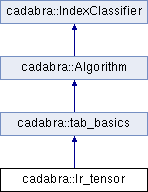 |
Cadabra
Computer algebra system for field theory problems
|
Loading...
Searching...
No Matches
 |
Cadabra
Computer algebra system for field theory problems
|
#include <lr_tensor.hh>

Public Member Functions | |
| lr_tensor (const Kernel &, Ex &) | |
| virtual bool | can_apply (iterator) override |
| virtual result_t | apply (iterator &) override |
 Public Member Functions inherited from cadabra::tab_basics Public Member Functions inherited from cadabra::tab_basics | |
| tab_basics (const Kernel &, Ex &) | |
| void | tree_to_numerical_tab (iterator, uinttab_t &) |
| Convert an Ex to a numerical Young tableau, using num_to_it below. | |
| unsigned int | find_obj (const Ex &other) |
| void | tabs_to_tree (uinttabs_t &, iterator, iterator, bool even_only) |
| The inverse, converting tableaux to Ex objects attached as children of the iterator. | |
| void | tabs_to_singlet_rules (uinttabs_t &, iterator) |
 Public Member Functions inherited from cadabra::Algorithm Public Member Functions inherited from cadabra::Algorithm | |
| Algorithm (const Kernel &, Ex &) | |
| Initialise the algorithm with a reference to the expression tree, but do not yet do anything with this tree. | |
| virtual | ~Algorithm () |
| void | set_progress_monitor (ProgressMonitor *) |
| Provide the algorithm with a ProgressMonitor object on which to register (nested) progress information, to be reported out-of-band to a client. | |
| result_t | apply_generic (bool deep=true, bool repeat=false, unsigned int depth=0) |
| The main entry points for running algorithms, which traverse the tree post-order ('child before parent'). | |
| result_t | apply_generic (iterator &, bool deep, bool repeat, unsigned int depth) |
| result_t | apply_pre_order (bool repeat=false) |
| Apply algorithm with alternative traversal: starting from the top node, traverse the tree pre-order ('parent before child') and once the algorithm acts at a given node, do not traverse the subtree below anymore. | |
| bool | check_consistency (iterator) const |
| Given an expression top node, check index consistency. | |
| bool | check_index_consistency (iterator) const |
| bool | check_degree_consistency (iterator) const |
| Given an expression top node, check differential form degree consistency. | |
| void | report_progress (const std::string &, int todo, int done, int count=2) |
| index_iterator | begin_index (iterator it) const |
| index_iterator | end_index (iterator it) const |
| unsigned int | number_of_indices (iterator it) |
| std::string | get_index_set_name (iterator it) const |
| bool | rename_replacement_dummies (iterator, bool still_inside_algo=false) |
| Rename the dummies in the sub-tree starting with head at the given iterator. | |
| Ex_set_t | dependencies (iterator it, bool include_derivatives_of=true) const |
| Determine all the Coordinate dependencies of the object at 'it'. | |
| bool | derivative_acts_on (iterator it) const |
| Is this a symbol on which a derivative acts? | |
 Public Member Functions inherited from cadabra::ExManip Public Member Functions inherited from cadabra::ExManip | |
| ExManip (const Kernel &, Ex &) | |
| bool | prod_wrap_single_term (iterator &) |
| Take a single non-product node in a sum and wrap it in a product node, so it can be handled on the same footing as a proper product. | |
| bool | prod_unwrap_single_term (iterator &) |
| bool | sum_wrap_single_term (iterator &) |
| bool | sum_unwrap_single_term (iterator &) |
| bool | is_single_term (iterator) |
| Is the indicated node a single term in an expression? | |
| bool | is_nonprod_factor_in_prod (iterator) |
| void | force_node_wrap (iterator &, std::string) |
| Wrap a term in a product or sum in a node with indicated name, irrespective of its parent (it usually makes more sense to call the safer prod_wrap_single_term or sum_wrap_single_term above). | |
Public Attributes | |
| sibling_iterator | tab1 |
| sibling_iterator | tab2 |
 Public Attributes inherited from cadabra::tab_basics Public Attributes inherited from cadabra::tab_basics | |
| std::vector< Ex::iterator > | num_to_it |
 Public Attributes inherited from cadabra::Algorithm Public Attributes inherited from cadabra::Algorithm | |
| bool | interrupted |
| unsigned int | number_of_calls |
| unsigned int | number_of_modifications |
| bool | suppress_normal_output |
| bool | discard_command_node |
| Stopwatch | index_sw |
| Stopwatch | get_dummy_sw |
| Stopwatch | report_progress_stopwatch |
Private Member Functions | |
| void | do_tableau (iterator &, int dimension) |
| void | do_filledtableau (iterator &, int dimension) |
|
overridevirtual |
Implements cadabra::Algorithm.
Implements cadabra::Algorithm.
| sibling_iterator cadabra::lr_tensor::tab1 |
| sibling_iterator cadabra::lr_tensor::tab2 |